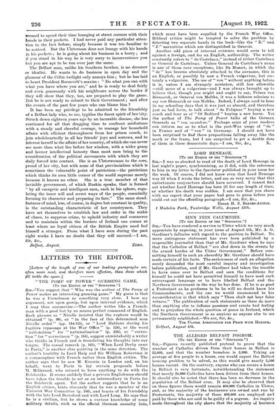THE ALLEGED BELFAST POGROM.
[To THE EDITOR OF THE " SPECTATOR."] SIR,—Figures recently published pretend to prove that the number of Catholics driven from their homes in Belfast is 23,060, and that the number homeless is 3,800. Taking an average of five people to a house, one would expect the Belfast housing problem to be solved, as this would give nearly 5,000 houses vacant. On the contrary, anyone who can secure a house in Belfast is very fortunate, notwithstanding the statement that nearly 24,000 Catholics have been driven from their homes. It should also be noted that there has been no decrease in the population of the Belfast area. It may also be observed that on these figures there would remain 480,000 Catholics in Ulster, and, as the majority of the businesses' are owned and run by Protestants, the majority of these 480,000 are employed and paid by those who are said to be guilty of a pogrom. An inquiry made throughout the city shows that the majority of business houses have mixed staffs, and in one of the leading hotels there are only two maids who are not Catholics. The Employment Exchange makes no distinction as to whether those who register as unemployed are Catholics or Protestants, and the only con- ditions of receiving out-of-work pay are such as are laid down in the Act, and on such relief works as are being carried out the rule is to employ in the proportion of one-third Catholics and two-third Protestants, on the basis of their proportion to the population. If a pogrom was being carried out, it would be easy to give all Protestants employment by turning out Catholics. Ulster displays the normal life of an organized com- munity, with the usual problems of trade depression and unemployment, the latter being due to the same causes which are operating in all countries at the present time. It is, therefore, untrue to say that unemployed Catholics in Belfast are unemployed by virtue of a pogrom, for they are receiving the same treatment as anyone else.—I am, Sir, &c., Uisreness.



































 Previous page
Previous page